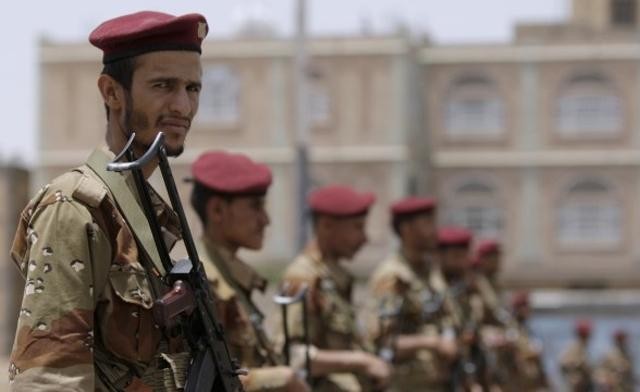Yemen’s chief of staff, Major General Taher Al-Aqeeli, revealed that the Yemeni army has received European and Asian offers of logistical support, noting that new agreements would be signed at a later stage in the interest of the army.
In an interview with Asharq Al-Awsat, Al-Aqeeli said that countries in the European Union, Eastern Europe and South-East Asia have “expressed a wish to provide logistical support to the army, and that there is cooperation with Australia on the maritime side.”
“All the efforts and actions that are currently being implemented are moving toward strengthening of the army to enable it to defend the country, in line with a clear and comprehensive vision … to become a shield for the homeland and the Arab and Islamic nation,” the Yemeni military official said.
“We will work hard to dissolve the tribal authority over the army through the proper establishment of the military institution,” he added.
Al-Aqeeli underlined the role assumed by the Arab coalition in restructuring Yemen’s military institution.
“The Arab coalition forces play an important and pivotal role in all directions, whether with regards to material assistance or advice provided by the coalition leaders to the Yemeni army. We must realize that our brothers in Saudi Arabia and the UAE have not only provided such assistance, but also stood with Yemen to defend the rights of the Yemeni people,” he stated.
Al-Aqeeli went on to say that the Saudi-led coalition has provided “all possible resources, and harnessed all the tools to serve and develop the army, and the results of this support can be seen on the ground.”
On the liberation of the remaining Yemeni territories, the chief of staff noted that the army was moving with accuracy “to reduce the war bill and to save civilian lives on all fronts.”
“Everyone must know that it is difficult to reveal everything, and the army depends on what it does, not what it says … the army will open new fronts, using conventional and traditional tactics in such confrontations, and carry out direct offensive actions,” he said.
Asked about the mechanism to liberate Al-Hodeida port, Al-Aqeeli stressed that plans to regain control over the area were linked to internal and international decisions.
“There will be a joint local, regional and international decision on Hodeida. There will be a move toward the city in time to create a balance on the importance of moving toward Sanaa or Hodeida,” he explained.
Commenting on calls by international organizations to return to dialogue in the wake of the Army’s advancement on the ground, Al-Aqeeli said: “The Iranian project dominates a number of Arab countries … they have exploited the sincerity of international organizations and influenced the public opinion by using these organizations to change the course of events.”
“But international organizations have uncovered the Iranian lies,” he added.
On the recent developments following the assassination of former President Ali Abdullah Saleh, the Yemeni chief of staff stressed that the army would carry major operations in coordination with the Arab coalition forces.
“There will be military surprises that will not be disclosed now,” he said. “The army will certainly work in coordination with the Arab coalition forces to take advantage of all the events taking place on the ground in Sanaa.”
He noted that the Yemeni Army has succeeded in attracting leaders and sheikhs from Sanaa to its ranks.
“The army embraces all the Yemeni people from all factions, including scholars, tribes, officials, and therefore it was natural for them to join the army to liberate the remaining cities. We count on them to achieve outstanding results,” he said.
Yemeni chief of staff says army has received international offers of logistical support
Yemeni chief of staff says army has received international offers of logistical support

Two Tunisia columnists handed over three years in prison

- Mourad Zeghidi and Borhen Bsaies have already been in detention for almost two years
- They were due to be released in January 2025 but have remained in custody on charges of money laundering
TUNIS: Two prominent Tunisian columnists were sentenced on Thursday to three and a half years in prison each for money laundering and tax evasion, according to a relative and local media.
The two men, Mourad Zeghidi and Borhen Bsaies, have already been in detention for almost two years for statements considered critical of President Kais Saied’s government, made on radio, television programs and social media.
They were due to be released in January 2025 but have remained in custody on charges of money laundering and tax evasion.
“Three and a half years for Mourad and Borhen,” Zeghidi’s sister, Meriem Zeghidi Adda, wrote on Facebook on Thursday.
Since Saied’s power grab, which granted him sweeping powers on July 25, 2021, local and international NGOs have denounced a regression of rights and freedoms in Tunisia.
Dozens of opposition figures and civil society activists are being prosecuted under a presidential decree officially aimed at combatting “fake news” but subject to a very broad interpretation denounced by human rights defenders.
Others, including opposition leaders, have been sentenced to heavy prison terms in a mega-trial of “conspiracy against state security.”
In 2025, Tunisia fell 11 places in media watchdog Reporters Without Borders’ (RSF) World Press Freedom Index, dropping from 118th to 129th out of 180 countries.











